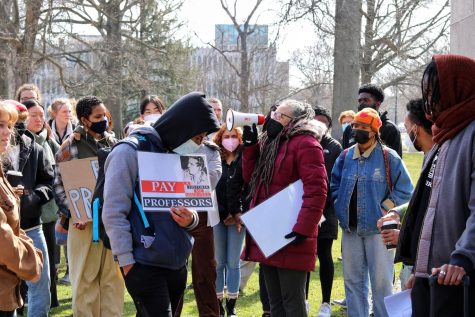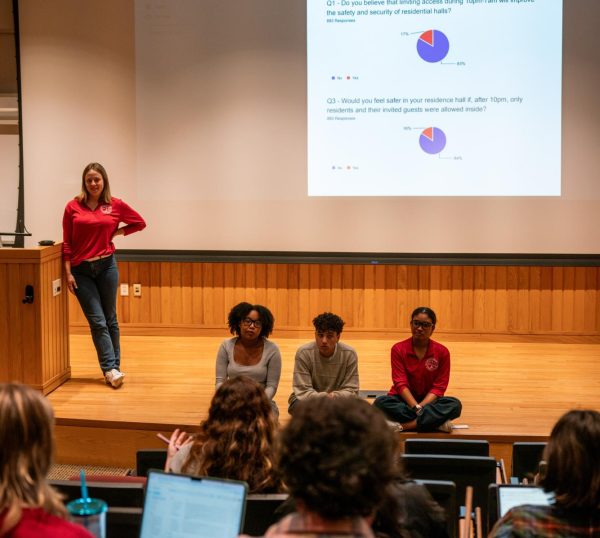Students Call for Equitable Compensation, Better Treatment
Student-workers shared their experiences and concerns at the March 10 protest against stagnant faculty compensation.
Last Thursday, over 200 students gathered in Tappan Square to stand in solidarity with professors against stagnant faculty compensation. While this was the main focus of the protest, many students shared their own experiences and concerns about their treatment and compensation as student-workers at Oberlin, while also highlighting a lack of accessibility for disabled students and students of color and support for mental health issues.
The Office of Student Employment oversees over 800 student-workers each academic year, including many who work to fulfill their Federal Work-Study awards. According to the Office, students are not allowed to work more than 30 hours a week and are paid between $9.30–12.75 an hour. Student-workers at the faculty protest last Thursday revealed that they felt underpaid, undervalued, and overworked.

Several students stated that they have to work multiple jobs to make enough money to support themselves, and also feel they are put on display to showcase Oberlin’s commitment to balancing academics with employment.
“I do find that sometimes student- workers are put in these very weird situations of having to represent the College,” said double-degree fifth-year Kopano Muhammad, who helped organize Thursday’s protest. “I feel like I am kind of pushed into situations where I am asked to be, like, participating in respectability politics … I don’t have time to be performing for a college.”
On the other hand, Chief Human Resources Officer Joe Vitale maintained that students are compensated fairly for their work based on the scope of activities they do in their jobs.
“For all student employment, the rate of work, compensation, and review is determined by the scope of work and responsibilities,” Vitale wrote in an email to the Review.
In addition to extra work, students expressed frustration that they often do not receive timely compensation. When she worked at the Admissions Office, College third-year Stephanie Shugert had a hard time negotiating when she would receive her paycheck.

“When I was a tour guide over the summer, I did not get paid until the end of the summer semester,” Shugert said. “I definitely went up to speak to my supervisors about me not getting paid. … I would let them know and they’re like, ‘Okay, no problem. The next two weeks, it should come out and everything should be on your paycheck.’ And then they didn’t. And so I went back again, and I was just angry and I ended up quitting.”
Many feel that increased compensation for both students and staff would improve the services and morale of many workers on campus.
“My work shifts between weeks,” College third-year and Teaching Assistant Joshua Jackson said. “Sometimes I am delivering DVDs, other times I am creating presentations. The most work occurs in the classroom … as I [go] back and forth between facilitating discussions and aiding in lecture or film presentations. … If I was valued, I would be paid for my work more adequately.”
When expressing their concerns, students emphasized their support for the protest organized by Jane and Eric Nord Associate Professor of Africana Studies Pamela Brooks and Associate Professor of Africana Studies and Comparative American Studies Yveline Alexis, stating that the staff and faculty are not the problem; rather, the issue lies in Oberlin’s lack of proper compensation.
“I feel very valued by my professors that I assist in teaching,” Jackson said.
Students also brought up concerns about campus jobs paid through stipends rather than hourly pay. Shugert spoke about this issue at the event. Shugert is the resident assistant of Zechiel House — the Latinx Heritage House. She discussed how she was the only RA at Zechiel, responsible for over 40 students in the dorm.
“I’m the only RA for a whole building,” Shugert said. “Other RAs are getting paid the same amount as me [and] only have 20 residents.”
The Office of Residential Education recruits and hires RAs, places them in dorms, and determines their stipend. RAs cultivate and create communities within dorms and are tasked with the upkeep of certain dorm areas, halls, or wings — or entire dorms, in Shugert’s case. Yet, as RAs such as Shugert have expressed, the effort they put into their work has no effect on what they are paid.
“All RAs are paid $3,150 per semester,” wrote Director of Residential Education and Assistant Dean of Students Andy Sadouskas in an email to the Review. “RA stipends are reviewed yearly.”
While many schools also significantly reduce or completely cover food and living costs for RAs, Oberlin only takes five percent off food and living costs.
Students hope the conversation about the treatment of student workers and faculty will open up a discussion on the College’s employment policies, as well as improvement in the resources and support for disabled students and students of color and for those that face mental health issues.






